On May 1st, the General Conference of the United Methodist Church made changes to their rules relating to the LGBTQ community. They now allow LBGTQ clergy, and have a new, LGBTQ-inclusive definition of marriage. News of these changes sparked significant debate on X (Twitter), as users voiced their opinions on the role of the LGBTQ community in modern day Christianity. While much of the discussion was civil, the debate also featured a significant number of homophobic posts. It is reminiscent of the homophobia during Australia’s same sex marriage postal vote.
Since Elon Musk took control of twitter in 2022 the platform has faced increased scrutiny regarding hate-speech. In their Social Media Safety Index for 2023, GLAAD identified X as the only major social media platform to see a decrease, rather than an increase, in safety for LGBTQ users. In fact, this report listed X is the most dangerous social media platform for LGBTQ users. The homophobia in response to the UMC’s change in policy is therefore a continuation of a pre-existing problem on X. This briefing documents some of the different forms of homophobia on X following the UMC’s policy change.
Homosexuality as a sin/the work of satan:
Some of the responses to UMC’s change in policy propagated the idea that homosexuality is a sin, or that UMC is now a tool of the devil. Writing in reply to tweets about the change, one user writes “The Methodist Church should no longer be referred to as a Church” while another says it is “basically satanism masquerading as Christianity”. Another reply calls the change an abomination and says the devil is celebrating.
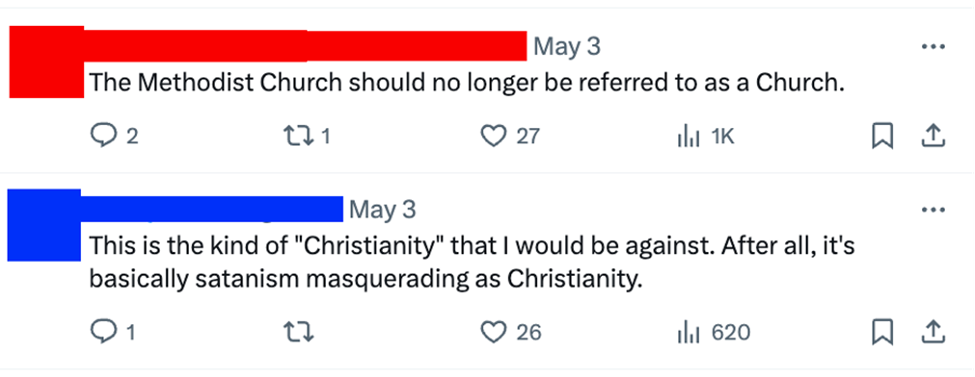
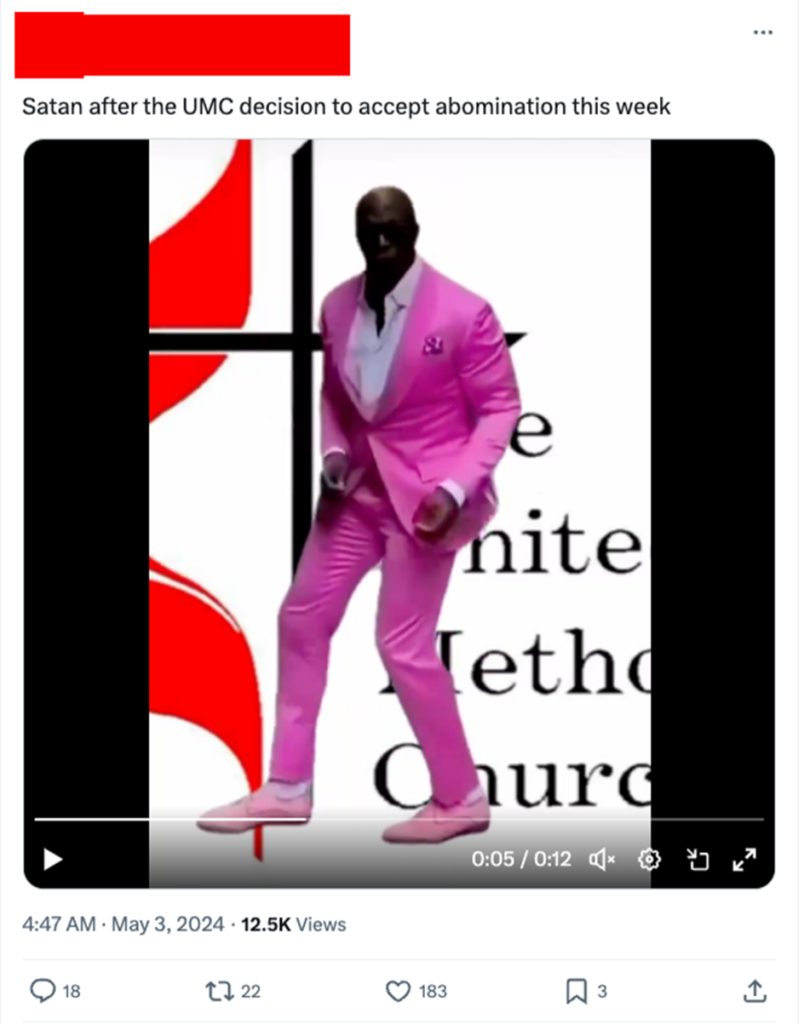
This next tweet describes the UMC’s decision as “affirming sin”, and shares an image which highlights the word “demon” in “pride month”. Once again, the implication is that homosexuality is sinful and demonic.
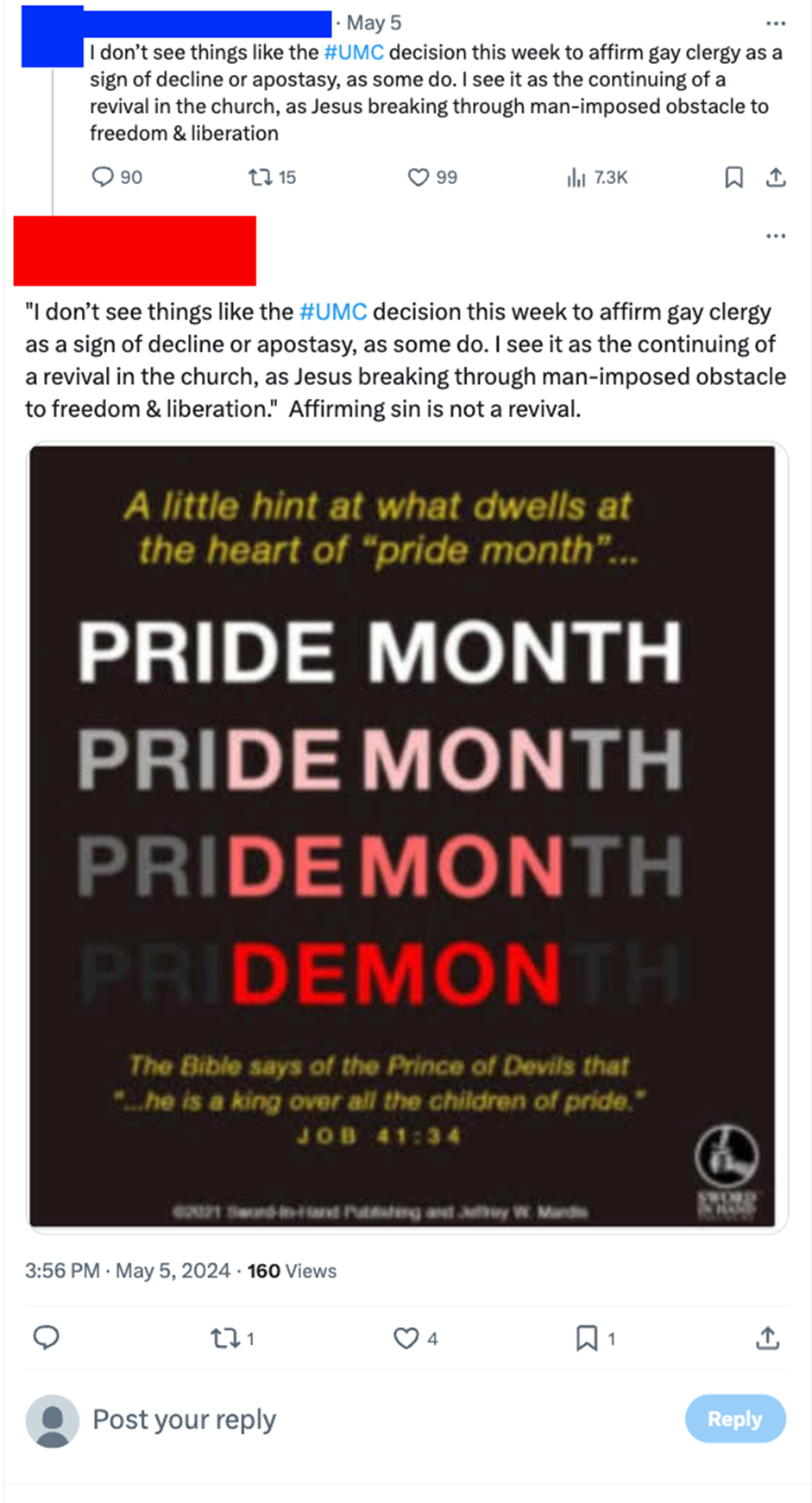
Another user (in red) argues that the UMC have “rejected God’s truth” by repealing their anti-LGBTQ rules, and describes the changes as “abominations”. This user also describes homosexuality as a “meaningless expression of lust”. This post feeds into the homophobic narrative of homosexuality as a mere perversion or sexual fetish, rather than a legitimate sexual identity.
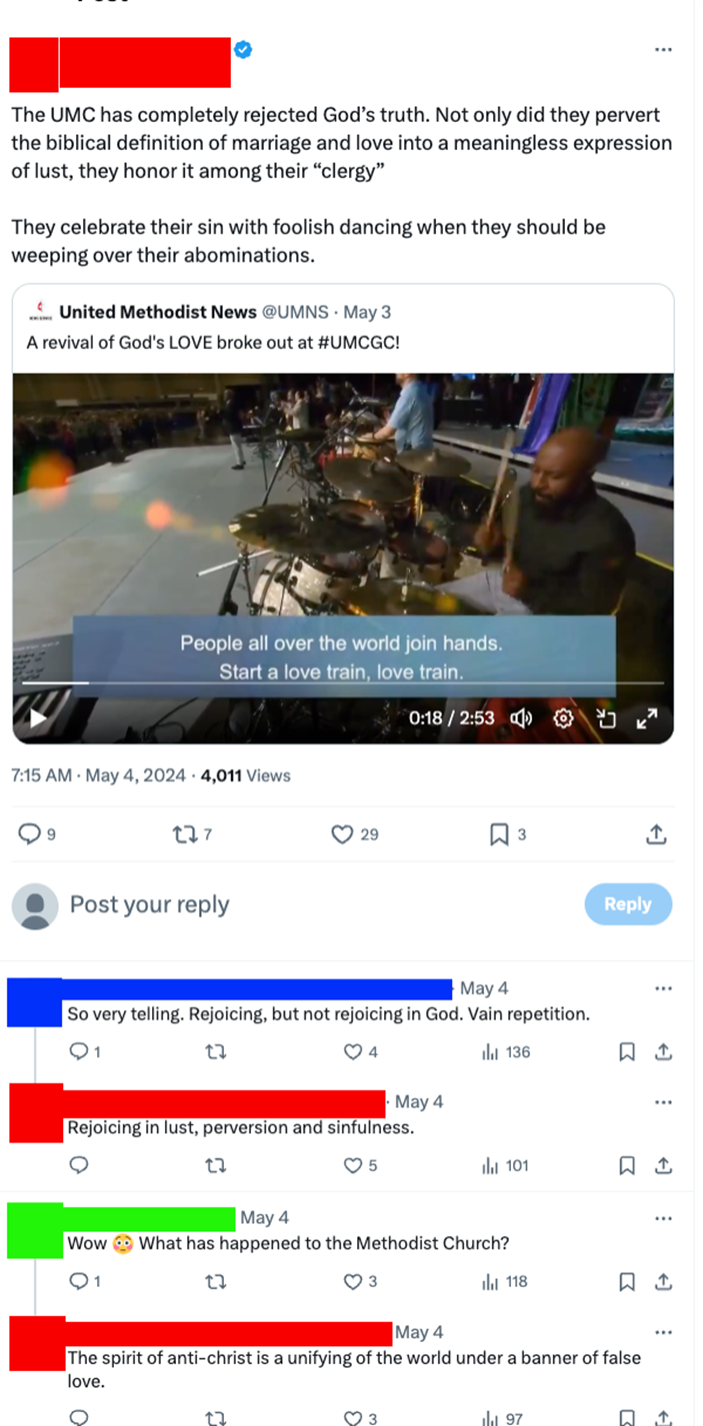
Homosexuality as a threat to society:
Another kind of homophobia portrayed homosexuality as a threat to society. The tweet implies that allowing homosexual practices will “bring destruction to individuals, nations and civilisation”, propagating the narrative that homosexuality is a threat to civilisation.
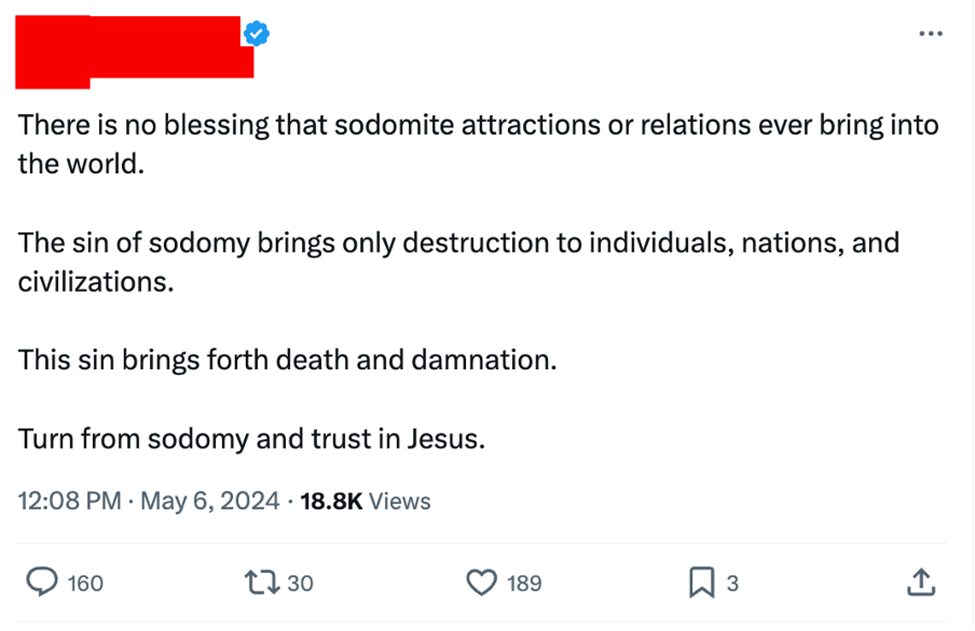
This next tweet exhibits a number of homophobic narratives. As well as implying that homosexuals are sinners who can only avoid hell with repentance, it refers to “unclean abominable sex acts” and implies that homosexuality involves “leading others to abominable sex acts”, thus feeding into the idea that homosexuality constitutes a threat to broader society.

Other posts implied that homosexuality is inherently predatory or podophilic. One person implies that the original “purpose” of homosexuality is to “expose kids to it”, thus equating homosexuality to paedophilia. Another user implies that allowing homosexual practices leads to child grooming and medical castration (a punishment, in some regions, for sex crimes). Once again, the user falsely equates homosexuality with paedophilia.

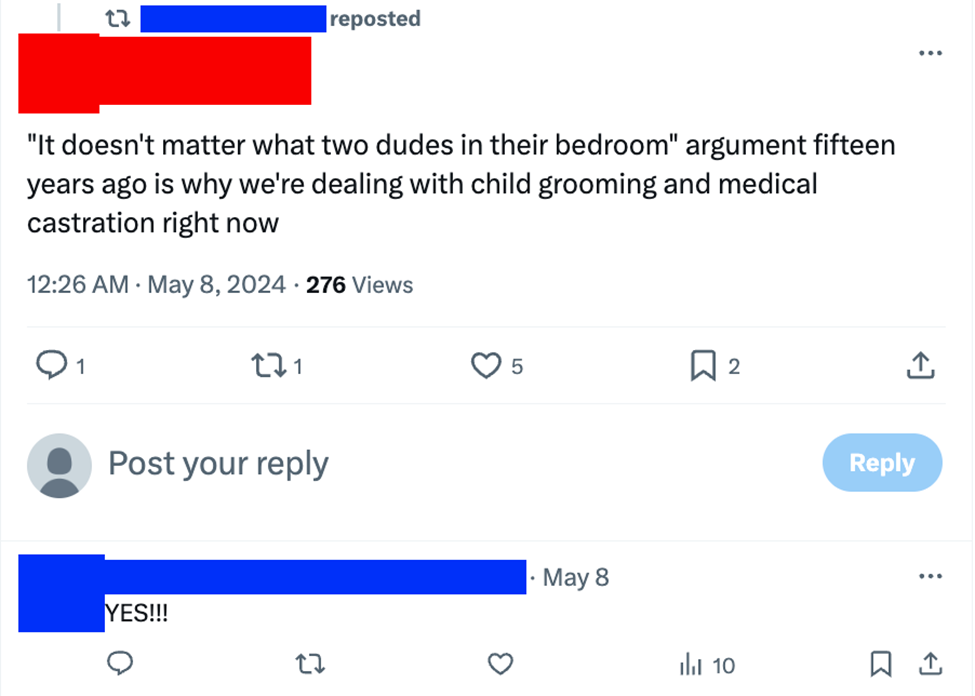
Homosexuality as a choice:
Some commentators propagated the view that homosexuality is a choice. This stance often accompanies religious condemnations of homosexuality, as it allows commentators to side-step questions about why God would create homosexuals if homosexuality were a sin. It also implies that practitioners of homosexuality can more easily change their behaviour, as they can simply opt into heterosexual practices without this being in any way at odds with their nature. These are views behind “conversion practices”, something that was criminalised in Victoria in 2022 and can be reported to the police.
We found multiple examples of users claiming that nobody is “born gay”, and that homosexuality instead arises as a result of child abuse. Phrased a little differently, one post claims “there is no such thing as a gay person”, that it is simply a sin and that “all must repent to be in Christ”. Once again, we see users denying the reality of homosexuality in order to defend their religious condemnation of homosexual practices.
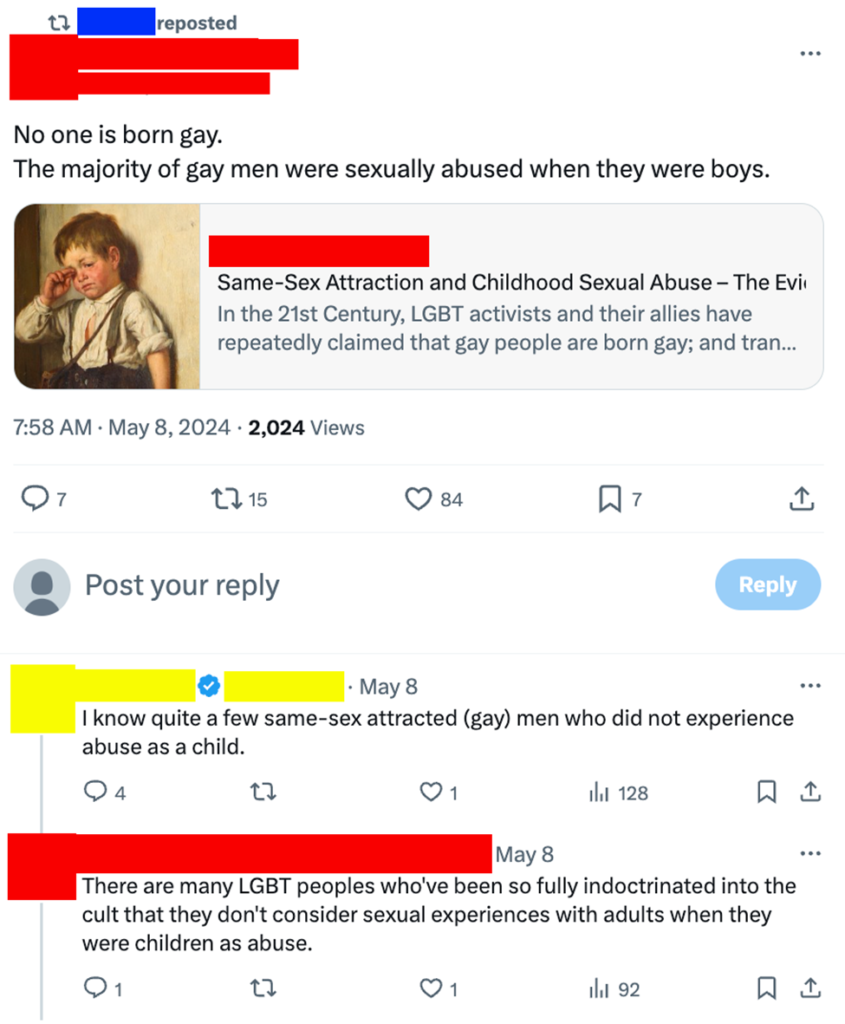
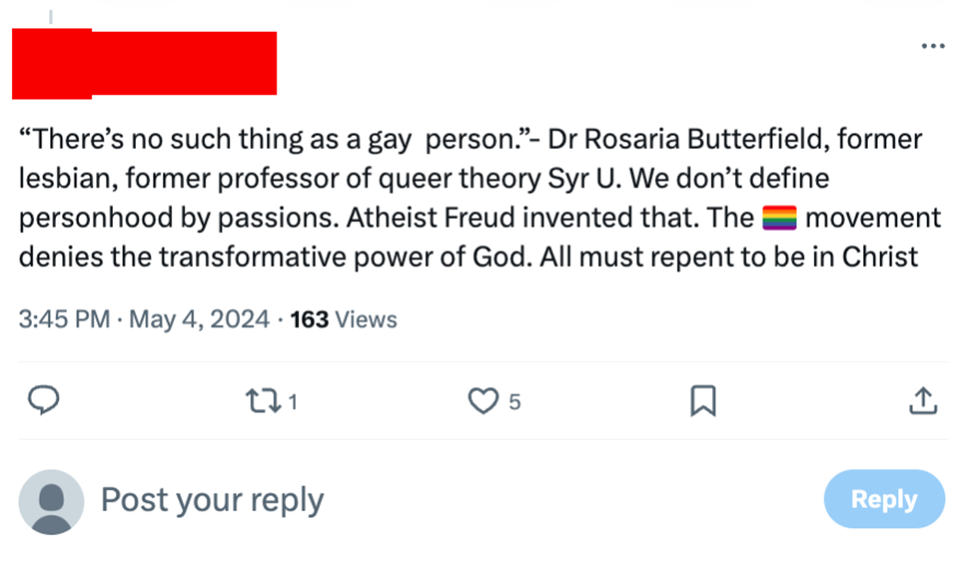
Conclusion:
Homophobia, already a significant problem on X, rose in response to UMC’s change in rules regarding the LGBTQ community. We found posts about homosexuality being a sin or the work of the devil, the idea that homosexuality is a threat to society or inherently predatory, as well as posts denying the reality of homosexuality.
Elon Musk is often referred to as a “free speech absolutist”, and it is possible X will opt to allow these posts in the name of free speech. Many of these posts condemn homosexuality on religious grounds, and so policing such posts in the US could potentially be seen as infringing on user’s rights to religious freedom. In Australia it was made clear in the Catch the Fire Ministries Case back in 2006 that religious freedom does not include the right to vilify others.
X’s policy on Hateful Conduct is in line with Australia’s law and prohibits attacks based on sexual orientation, including “slurs, tropes or other content that intends to degrade or reinforce negative or harmful stereotypes about a protected category”. Posts which portray homosexuality as sinful, predatory or fictional remain common on the platform despite these rules. Though all of the posts featured in this briefing were reported to X, none of them were removed. X claimed that six of the posts did not break the platform’s Safety Policies, and have not commented on the others. X needs to be more effective in enforcing its policy on hateful conduct, especially in response to news stories that relate to LGBTQ rights.
